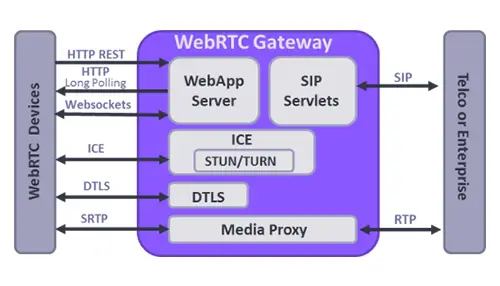WebRTC is a Real-Time Communication platform that doesn’t require any additional plug-ins for communication between peers. WebRTC is supported by all major browsers such as Mozilla Firefox, Chrome, Opera, and Safari, etc. It enables a user to communicate with another user in terms of video calling, audio calling, video conferencing, and screen sharing, etc.
Do you wonder how WebRTC for Firefox works? How WebRTC Firefox is different from that of other browsers? Do you have any idea about WebRTC Extension for Firefox? Then you can go through this following post to know about these things.
WebRTC is an open-source platform that enables web applications and sites to collect and stream the audiovisual media. It also enables users to share generic data files easily without any intermediary. These things are made possible by the set of API standards because of WebRTC is now the most popular RTC platform who is conducting its operations without any host software or servers. WebRTC is supported by most commonly used browsers such as Mozilla, Chrome, and Opera. But the functionalities of no two browsers are the same.
Mozilla Firefox is the most commonly used browser among the other browsers. WebRTC for Firefox is the fast, reliable, open-source platform that respects your privacy completely. When WebRTC Firefox is fused with the market share of Chrome, the gross percentage of the WebRTC enabled browsers in the world indicates to approximately 64%. Firefox is the only browser that is enduring completely in the public domain since its inception.
WebRTC for Firefox
WebRTC for Firefox was established in April 2011, which was concerned with WebRTC based development frameworks and discussions. Firefox introduced the three major sets of APIs in December 2012 such as-
1. getUserMedia
2. RTCPeerConnection
3. RTCDataChannel
WebRTC has been completely mingled to Firefox29 previously. Since 2013 WebRTC Chrome and WebRTC Firefox have been completely inter-related in terms of productivity.
The Functionality of WebRTC for Firefox
The execution of WebRTC for Firefox is done similarly to that of WebRTC for Chrome. The same three JavaScript APIs are used here such as- getUserMedia, RTCPeerConnection, RTCDataChannel from the hub composition of WebRTC for Firefox. The mechanism is the same for WebRTC for Firefox such as-
1. The media and documents are collected from one end-user by getUserMedia via the computer’s microphone and camera.
2. Those data and media are transferred to RTCDataChannel by RTCPeerConnection.
3. The documents and media files are transmitted to the other end-user by RTCDataChannel.
When these three APIs are taken together, then they have the potential to share any mode of credible real-time data.
In a broader view, the main issue faced by Firefox is the external server-side signaling implementation that allows the users to construct connections among each other rather than API code. The mechanism is not involved with the browser itself rather the solution is there in the form of a previously continuing signaling platform.
NAT Traversal
NAT or Network Address Translation is being used to assign IP addresses into another space by slightly modifying the network address information. This is usually done when the packets are in a transition mode across a traffic routing device. This technique is adopted in the form of protection where unsolicited traffic is not allowed to the user’s device. Especially for a platform like WebRTC Firefox who uses different types of mediums for signaling and transferring data, it’s quite impossible to identify such traffics.
The NAT traversal problems are identified when the peers behind different NATs try to communicate among themselves. It can be stopped using the different NAT traversal techniques like TCP hole punching.
How WebRTC for Firefox is Different
Though WebRTC for Firefox and WebRTC for Chrome both utilizes the same sets of APIs, still the contraption of both the browsers are different. WebRTC to Firefox is lacking with some features that WebRTC for Chrome has. Though the codecs such as G.711, Opus, and VP8 are natively consoled by WebRTC for Firefox, WebRTC to chrome supports iLBC, iSAC, and G.722 codecs. The expulsion of these codecs will affect the applications using peculiar voice frequencies.
Since the arrival of the signaling mechanism, the WebRTC for Chrome and WebRTC for Firefox has become more compatible. The Signaling mechanism uses the offer method to differentiate the getUserMedia specification of each caller. Then a shared codec is imposed to instigate the connection. When a Firefox browser tries to connect to a chrome browser using iLBC codec, then the Chrome browser will be forced by a signaling mechanism to validate either Opus or G.711 so that both the browsers will be compatible with each other.
WebRTC Extension for Firefox
Since WebRTC uses different signaling mechanisms and media there are chances you may suffer WebRTC leak. WebRTC extension for Firefox will help you protect your browser and IP address against any leak without completely disabling WebRTC. It helps you with the following things –
A. Control your data: The VPN used by WebRTC may sometimes leak your data without your consent. The WebRTC extension for Firefox helps to block analytics trackers that ensure your browsing stays secured.
B. Purge cookies and local storage: The extensions help you remove the cookies stored on your device right after your browsing completes. This ensures you will never further be bothered by unnecessary ads.
C. Remove Unwanted Noise: The WebRTC extension for Firefox helps you remove thousands of advertisements so that your focus will be retained on the content you are looking for. Since the advertisements are blocked, your browsing speed will be high and you can enjoy the obstacle-free experience.
WebRTC Firefox; An Upstanding Movement In The New Digital Era!
By seeing the current growth of Firefox, it can be projected that Firefox may excel Internet Explorer’s market share very soon. Since the interoperability issue between Chrome and Firefox is solved, it will give birth to more number of users connected to WebRTC for Firefox. By noticing the fact that around half of the internet has been provided with the in-browser real-time communication now and with the development of WebRTC, it is clear that WebRTC for Firefox will be one the most popular Real-Time Communication Platform.
CONCLUSION
With the continuous development, it is visible that WebRTC for Firefox is becoming more flexible to use and gathering appreciations by its users. But still, certain issues related to NAT as well as VPN are noticeable. Oditek solutions will provide with WebRTC Extensions for Firefox which will ensure your privacy to be secured. We are also providing a well-structured signaling platform that is pivoted to traverse the issues related to NAT and firewalls that are causing obstacles to the in-browser communication.







